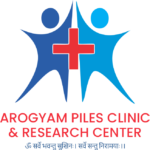Anal fissures, a common yet distressing condition, are small tears in the skin around the anus, leading to pain and sometimes bleeding during bowel movements. Dr. Vinay Kumar, a Senior Proctologist and Kshar Sutra Surgeon at Arogyam Piles Clinic and Research Center in Mohali, Chandigarh, emphasizes the significant role of diet in the management of anal fissures. This guide is drawn from his expert insights and aims to outline dietary choices that can aggravate the condition, alongside recommending adjustments for prevention and long-term care.
Definition of Anal Fissures
An anal fissure is a tear in the mucosa of the anal canal, causing sharp pain during and after bowel movements. These fissures can occur due to excessive straining, constipation, or passing hard stools, making it essential to understand how diet influences their development and management.
Role of Diet in Anal Fissure Management
Diet plays a critical role in both the prevention and management of anal fissures. A balanced diet rich in fiber can soften stools, making bowel movements less painful and reducing the risk of new fissures developing. Conversely, certain foods can exacerbate the condition by causing constipation or diarrhea, leading to further strain and discomfort.
Foods that Aggravate Anal Fissures
Processed Foods: High in unhealthy fats and low in fiber, processed foods can lead to constipation, exacerbating pain and discomfort.
Red Meat: Difficult to digest, red meat can slow down bowel movements, increasing the risk of tearing.
Spicy Foods: These can irritate the anal region, leading to increased pain during bowel movements.
Dairy Products: For individuals with lactose intolerance, dairy can contribute to constipation or diarrhea, worsening symptoms.
Caffeinated Beverages: Coffee and certain teas can dehydrate the body, making stools harder and more difficult to pass.
Recommended Dietary Adjustments to facilitate healing in fissure patients :
To support the healing of anal fissures and prevent their recurrence, Dr. Kumar recommends incorporating foods rich in fiber, such as fruits, vegetables, whole grains, and legumes, into your diet. Additionally, staying hydrated by drinking plenty of water and avoiding alcohol can help maintain soft stools and regular bowel movements. These dietary adjustments can significantly reduce strain during defecation, thus aiding in the management and prevention of anal fissures.
Dr. Vinay Kumar’s Expert Advice for fissure patients
Dr. Kumar advises patients to be mindful of their diet and bowel habits. He recommends avoiding foods that lead to constipation or hard stools, as these are primary contributors to the formation and exacerbation of anal fissures. Moreover, he suggests consulting a healthcare provider for a personalized diet plan that considers individual health needs and promotes healing and well-being.
Prevention and Long-term Care in Fissure
Preventing anal fissures largely depends on maintaining a healthy digestive system. Regular exercise, adequate water intake, and a fiber-rich diet are fundamental components of long-term care. Patients are encouraged to adopt these healthy lifestyle habits to minimize the risk of recurrence and promote overall colorectal health. Remember, early intervention and consistent management are key to preventing complications associated with anal fissures.



